 |
Reports according to Master’s order and rating
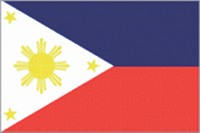
Filipino People Extended Their Hands
in Caring for the Aulacese Refugees
Madame Imelda Marcos Mothering the Stateless Boat People
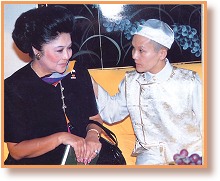 |
In 1991
Master Ching Hai thanked Madame Imelda R. Marcos (left) for opening
the Philippines’ doors to Aulacese refugees. |
In 1979, a vessel named Tung An with more than 2,000 Aulacese aboard reached Manila Bay. For eight long months they were barred from touching Philippine soil. It was not because the Filipinos are heartless and thoughtless, but because the whole world seemed unprepared. The United Nations was caught flatfooted and world politics had drawn imaginary lines of limitations and put up political barriers for protecting each country’s land, domain and vested interest.
Madame Imelda R. Marcos, the First Lady of the Philippines at that time, wife of the well-known Asian strongman Ferdinand E. Marcos, first issued a statement in support of temporary shelter for the more than two thousand souls afloat Manila Bay in Tung An.
A tear-jerking report from Tung An revealed that five people divided a banana for one day’s meal. This caused Mrs. Marcos to cry. “We are all refugees, if they are stateless, we are all stateless, no one in the world has a country of their own, for we are all refugees,” she said. As a result, a place in Puerta Princesa in Palawan City was declared a temporary shelter (The Philippine Refugee Processing Center, universally known as the PRPC) for the boat people who waited for the policy on: what to do with these men and women from the sea.
For the beneficiaries of PRPC, the humanitarian steps Mrs. Marcos took became the key in opening the shorelines of the Philippine soil to many more Aulacese boat people. A tidal wave of Aulacese was sheltered in the PRPC. Mrs. Marcos was no doubt the very first Philippine leader in Asia to fight for the Aulacese people. Perhaps her pioneering act became the signal that warmed the hearts of other leaders and helped them to move in unison to give a helping hand.
The Palawan Refugee Center received the blessings of the United Nations and was allotted funding to operate. Those who landed in refugee camps throughout Asia were automatically granted refugee status. After March 1989, however, the United Nations refused to recognize them as refugees. From that point on, their status became that of “asylum seeker,” with little hope to be resettled in a third country.
President Fidel Ramos
♥♥♥♥♥♥♥ Issued an Order Granting
Permanent
Residence to 5,000 Aulacese
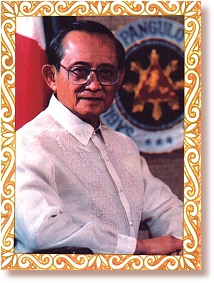 When
in 1995 the United Nations High Commissioner for Refugees (UNHCR) decided
to stop the funding for refugee camps throughout Asia, some countries
began “forced repatriation” to send the refugees back home,
sometimes by violent means. Many refugees protested this kind of treatment.
Some even committed suicide.
When
in 1995 the United Nations High Commissioner for Refugees (UNHCR) decided
to stop the funding for refugee camps throughout Asia, some countries
began “forced repatriation” to send the refugees back home,
sometimes by violent means. Many refugees protested this kind of treatment.
Some even committed suicide.
On June 9 1995, near the 97th Independence Day of the Philippines (June 12), President Fidel Ramos issued an order granting permanent residence to 5,000 Aulacese who entered the country before 1979. Upon hearing this news, The Supreme Master Ching Hai who had been working tirelessly to help find a home for the boat people, sent a letter to President Ramos and the Philippine Government congratulating them on their Independence Day and for their multitude of achievements. Above all, The Supreme Master thanked them on behalf of the 5,000 Aulac refugees.
When the UNHCR stopped funding the camps, the Philippine government considered sending the remaining Aulac refugees home. The refugees themselves refused repatriation and went on a hunger strike. About 700 Aulacese escaped the Palawan refugee camp for fear they would be shipped back home. Many of them were minors without families since they would be the first to be sent back.
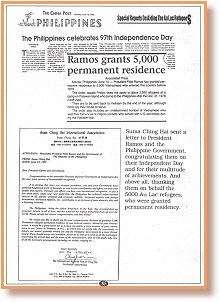 |
The news
clipping about President Fidel Ramos’ granting permanent residence
to 5,000 Aulacese and the letter of appreciation from Supreme Master
Ching Hai to President Ramos and the Philippine Government. |
The Catholic Church ♥♥♥♥♥♥♥ backed the refugees and criticized the Philippine government for abandoning them. Despite international pressure, President Fidel Ramos decided to cancel the plan to repatriate them, and instead allowed 2,600 “asylum seekers” to stay indefinitely in the country under the supervision of the Roman Catholic Church. In one defining moment, the Philippines became the only country in the world to offer permanent refuge for the Aulac “asylum seekers.”
Actually, no specific laws were passed for their legal residency, but amazingly, it was a great miracle that even without any specific laws for the Aulacese to live in the Philippines, they were given an utmost treatment to stay in the country and were offered an opportunity to decide for themselves whether to remain in the Philippines, or to continue their struggle to reach the country of their choice.
In my opinion, our country allowed their stay based mainly on humanitarianism with the prodding of many concerned citizens and the influential Catholic Bishop Conference. President Ramos, a strong Christian leader, dealt with the problems of the Aulacese people warmheartedly. The Aulacese were accorded a cordial stay and were allowed to move about the entire country as if they were living in their own homeland.
Many Individuals and Organizations Extended Their Hands
At the same time, many efforts were made to help the remaining Aulac boat people. The Supreme Master Ching Hai International Association provided them with both material and spiritual support. In addition, many individuals and Non-governmental organizations such as attorney Trinh Hoi, himself a past refugee, Boat People S.O.S. headed by Doctor Nguyen Dinh Thang, and Legal Assistance for Vietnamese Asylum Seekers (LAVAS) all worked hard to lobby for the resettlement of the Aulacese boat people to a third country. As a result, in April 2004, the US and Philippine governments came to an agreement regarding the resettlement. On September 26, 2005, the first batch of 229 Aulacese boat people landed in America under an agreement allowing the remaining 1,600 Aulacese asylum-seekers in the Philippines to resettle in the United States.
Thanks to the compassion and the humane cooperation between the Philippine Government and the Catholic Church, together with the open heart of the Philippine people and the kindness of the American people, the Aulacese “boat people” finally were able to conclude the last chapter of their story with a happy ending.
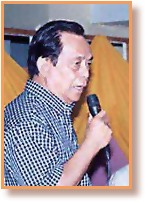
♥♥♥♥♥♥♥
Senator
Aquilino Q. Pimentel Jr. Represented
the Humanitarian Minds of Filipinos
For historical reasons, I include a copy of Senate bill 1152, for surely it will reverberate in history as a fitting illustration of how the Filipinos sincerely cared for our Aulacese brothers and sisters. This bill authored by Senator Aquilino Pimentel Jr., was filed in 2003 while the remaining 2,000 or more boat people were still uncertain of their plight. Although this bill never became a law, it showed the humanitarian thinking of the political representatives in shaping laws of the land.
The following is the explanatory note for the bill:
SENATE S. B. No. 1152
Introduced by Senator Aquilino Q. Pimentel Jr.
EXPLANATORY NOTE
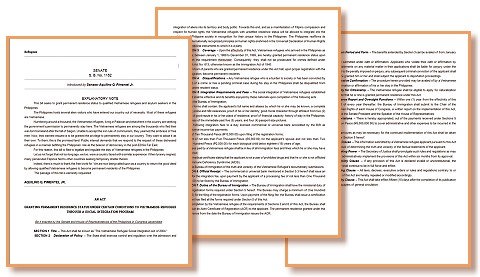 |
Senate Bill 1152, authored by Senator Aquilino
Pimentel Jr. |
This bill seeks to grant permanent residence status to qualified Vietnamese refugees and asylum seekers in the Philippines. The Philippines hosts several alien visitors who have entered our country out of necessity. Most of these refugees are Vietnamese. Numbering around a thousand, the Vietnamese refugees, living in Palawan and elsewhere in the country are seeking the government’s permission to permanently stay here. The Vietnamese refugees are among the thousands who fled their war-torn homeland after the fall of Saigon. Unable to accept the iron rule of communism, they yearned the embrace of free men. Now, their earnest request is to be granted the privilege to permanently stay in our country. They want to adopt it as their own. To them, this is the “promised land.” Public interest demands that we respond to the request of these distressed refugees in a manner befitting the Philippines’ role as the beacon of democracy in the post-EDSA Far East. For this reason, this bill is filed to legalize and regulate the stay of Vietnamese refugees in the Philippines. Let us not forget that not too long ago, we too, were a country faced with a similar experience. When tyranny reigned, many persecuted Filipinos fled to other countries seeking temporary shelter therein.
Indeed, there is much to thank the free world for. We are now being called upon as a country to return the good deed by allowing qualified Vietnamese refugees to become permanent residents of the Philippines. The passage of this bill is earnestly requested.
AQUILINO Q. PIMENTEL JR.
* The author of this article, Mr. Joe Lad Santos, is a Filipino reporter who accompanied Master Ching Hai on a visit to Palawan on April 8, 1991. He said he was very lucky to be an eyewitness.
| << | Contents | >> |
|
Refer this page to friends
|
||